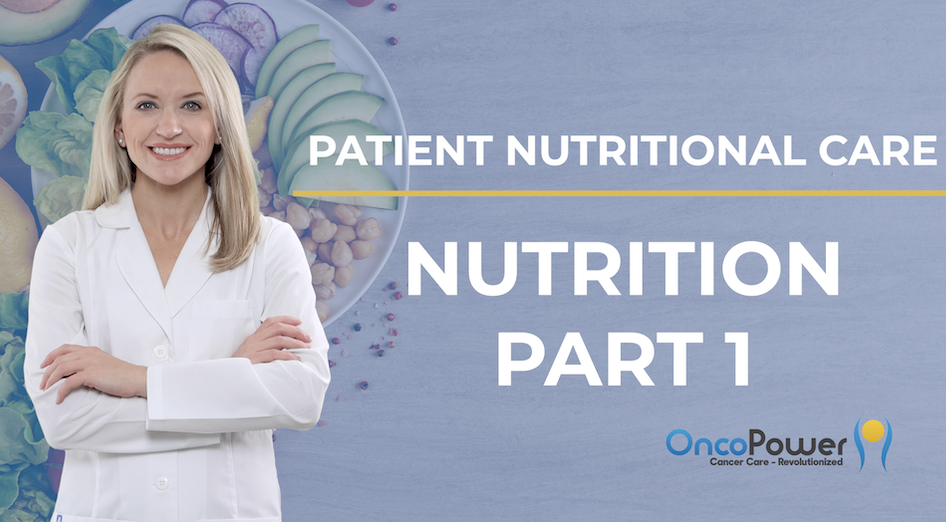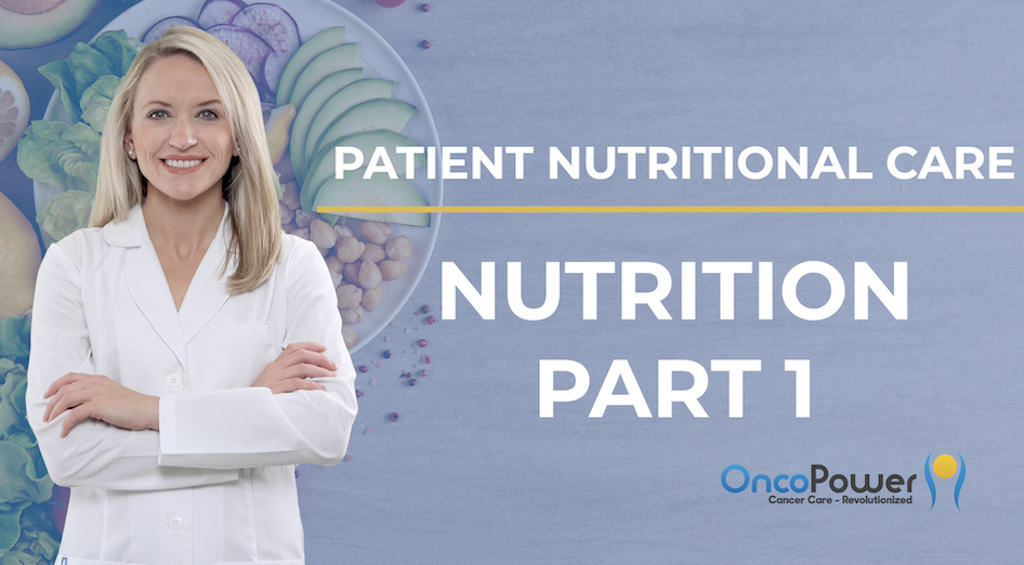Cancer Nutrition
Apr 09, 2021
Share

Nutrition Care
I want to go over some general nutrition recommendations in three short videos.

I will go over
- about using nutrition to manage side effects in Video 2 (log in to view)
- about food safety in Video 3 (log in to view)
While this is broad guidance based on quality evidence, we recommend you consult with our Registered Dietitian, to tailor a plan to your specific needs.
How to maintain a healthy weight.
- During many cancer treatments, patients can experience loss of appetite or decreased oral intake due to uncomfortable GI side effects such as nausea, vomiting, diarrhea, or constipation, or as a result of some medications.
- The main focus of our nutrition interventions is to help you to take in sufficient calories to maintain your current weight through the course of treatments, so ensure your body stays healthy and can recuperate from treatments accordingly.
- There may be instances in which weight loss before or after treatment in obese persons is appropriate, but your doctor would let you know if it is needed in your case.
- You can also consider adding oral supplemental shakes to your diet, if you feel you are not eating well. Your Registered Dietitian can guide you about which supplements are right for your body, and how much to take in to meet your needs.
- Weigh yourself regularly. If you notice weight loss that is more rapid than 1 pound per week, contact your Registered Dietitian, so that they can help you manage this appropriately.
Getting essential nutrients.
- Getting essential nutrients means consuming a variety of foods, with balanced portions of protein, carbohydrates, and fats, alongside plenty of fluids. During your treatments, your healthcare team does not recommend any dietary restrictions, unless medically necessary due to your cancer diagnosis or other conditions, which would be discussed with you at your visits.
- Getting the appropriate amount of total calories for maintaining your weight, as well as staying hydrated are most important while fighting cancer. Your Registered Dietitian will provide you with goals for calorie intake and fluids to meet these needs, and help monitor your intake and adjust through your treatment course.
- Depending on your needs, taking a multivitamin or specific vitamins and minerals that you aren’t getting enough of during treatment may be necessary. Nutritional supplements such as Boost or Ensure also can help you meet these needs. Before taking any supplements, please discuss with your healthcare team.
It is important to remain as active as you can.
- Exercising to maintain your muscle mass as best possible is key to fighting through treatment with energy and rebuilding strength after treatments.
- For example, take a daily walk or incorporate lower impact activities such as tai chi, yoga, meditation and stretching, or swimming into your exercise pattern.
- Once your treatment is complete, ask your healthcare team about our Cancer Exercise Rehab Program available for patients.
While this is broad guidance based on quality evidence, we recommend that you consult with our Registered Dietitian, either personally or using the computer, to tailor a plan to your specific needs.
How to use nutrition to manage treatment side effects?
Cancer treatment often causes side effects, such as nausea, mouth sores, and taste changes which may make it difficult to eat or drink.
Follow these tips to help you manage side effects:
- If water tastes unpleasant to you:
- take in more liquid through foods and other drinks like soups, popsicles, or
- fruits like watermelon, flavored water, beverages like Gatorade, Powerade, or
- try tea, lemonade, or milk.
- If food tastes bland,
- try seasoning it with flavorful spices such as lemon, garlic, and rosemary.
- Some prefer to simply eat bland foods, such as breads, oats, pastas, mashed potatoes, dairy products, as this helps to mentally cope the taste alterations.
- If you have a metallic taste in your mouth.
- Try things such as mints, chewing gum, teeth brushing more frequently
- Even bites of fresh citrus (yes even sucking on lemon slices), or drinking tomato juices can help
- use plastic or bamboo utensils and cook in nonmetal pots and pans, especially avoiding cast-iron cookware.
- If you experience mouth sores or gum tenderness,
- choose soft, moist, non-acidic and non-spicy foods.
- Use a blender or food processor to make vegetables and meats smooth.
- Smoothies or milkshakes may be a great option that can also help you get additional calories in a texture that is comfortable for you.
- Tricks such as adding butter, mild sauces, gravy, ricotta, or cream to meals or recipes are great ways to add calories and a soothing texture.
- If you feel FULL with smaller portions
- try frequent meals are a great way to get those much needed calories
- try eating 6 small meals a day instead of 3 large meals.
- Choose calorie and protein packed items for those small meals.
- If meat becomes unappealing,
- try getting protein from other foods like fish, eggs, cheese, beans, nuts, nut butters, tofu, or high-protein smoothies or shakes.
- Also sneaking things like ricotta and silken tofu into mixed dishes can be a great way to add extra protein.
- If you are experiencing nausea or vomiting,
- be sure to take all medications as prescribed.
- Unless directed specifically, do not take medications on an empty stomach as this may exacerbate symptoms.
- Some dietary approaches include eating regular meals and snacks, drinking plenty of fluids, and eating bland foods such as crackers, chicken noodle soups, mashed potatoes, toast with peanut butter, etc. Some patients find that drinking ginger teas, or sucking on ginger candies or peppermints help to curb nausea, as well.
While diet can play a role, please reach out to your dietitian if you are experiencing severe constipation or diarrhea.
While this is broad guidance based on quality evidence, we recommend you consult with our Registered Dietitian, either personally or using the computer, to tailor a plan to your specific needs.
Many treatment options weaken the immune system and increase the risk of experiencing food-borne illness.
Patients receiving cancer treatment should follow some basic rules to make sure they are practicing food safety:
- Wash your hands before you handle food, as well as all food prep surfaces.
- Rinse vegetables and fruit thoroughly before eating them.
- Store meat and fish on the bottom shelf of the refrigerator.
- Use separate cutting boards for meat and vegetables.
- Refrigerate food after everyone has been served.
- Eat fully cooked foods and skip raw meats, seafood, or sushi.
- Do not eat unpasteurized foods and pay close attention to cheeses, milk, cider, and juices.
- Follow expiration dates and safe food storage practices.
Food safety is very important. If you have additional questions, talk with our Registered Dietitian at St. Bernard’s.
Eating a balanced diet that incorporates vegetables, beans and legumes, whole grains, and fruits is important during both treatment and recovery.
While there may be more specific recommendations tailored to you based on your specific cancer and treatment course, a healthy overall diet is important to regaining strength and achieving and maintaining a healthy weight.
These are broad evidence-based guidelines. We always recommend patients to consult our Registered Dietitian either personally or using the telehealth platform to tailor a plan to your specific needs.
Feel free to watch this video as many times as you would like or download scripts to read.
Be sure to watch Video 1 on how to Maintain Healthy Body Weight and ensure you receive Essential Nutrients and Video 2 on how to Nutrition to manage Side Effects from Cancer and Treatments.
If you have any additional questions, you are welcome to reach to your doctor’s office
Thank you and good luck!
Trusted by cancer patients around the world.
Joan-Smith
Virginia, United States
ChuckHastings
Florida, United States
DebraPearl
Pennsylvania, United States
Jennweeks
Iowa , United States
PatrickDW
Western Cape, South Africa
Jamie-Alexander
Floroda United States
CJ
Liz
Florida, United States
NYCynthia
New York, United States
Ferdi
California, United States